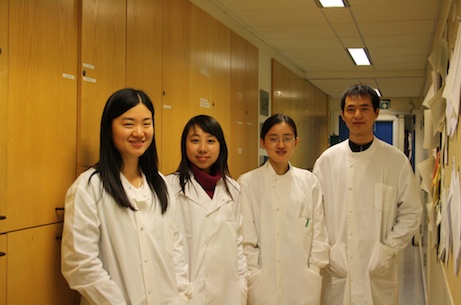
Gates Cambridge Scholar Xiaohan Pan has set up a company which will bring 16 Chinese entrepreneurs and students to Cambridge next month to learn about innovation.
Sixteen Chinese entrepreneurs and entrepreneurial students will come to Cambridge in February to attend an innovative short-term training course in enterpreneurial management and capital markets.
The programme is the first of a series of short-term training courses and visits organised by Wedge Education, a company set up by Gates Cambridge Scholar Dr Xiaohan Pan.
The course aims to showcase Cambridge as an innovation cluster and show how it has achieved that status. Participants will attend lectures given by Professor Chris Lowe, Dr William Bains and Dr Andy Smith on how to set up and run a high-tech company. They will also visit incubators in Cambridge and financial institutions in London before forming teams to present their business ideas to two prestigious judges. Other programmes planned by Wedge Education include “family succession”, “security analysis” and “social enterprise”. Many are tailor-made to suit demand. They can be on any subject, but Xiaohan is keen to emphasise enterpreneurship and leadership.
Since leaving Cambridge, where she did an PhD in Biotechnology, Xiaohan [2005] has been working at a hedge fund. She left in early 2013 to set up Wedge Education with a friend who is now doing her PhD in Cambridge. She says: “I made this transition because I believe in the power of education in changing people’s lives.” The company designs and organises short-term training courses and visits to the leading institutions in the UK for aspiring people in emerging countries. They are focusing mainly on China, given UK interest in strengthening its ties with China, and on Oxford and Cambridge Universities. Xiaohan says she is funding the company, which has two employees – one in China and one in Cambridge – from her savings. She adds that she has had a lot of support from her family, Professor Lowe, her supervisor at Cambridge and her former hedge fund bosses.
Xiaohan organised a similar visiting programme in 2009 [pictured] and says it was a student who took part in the programme who persuaded her to set up the company. “The student told me in early 2013 that the Cambridge exchange experience changed his life. He is now doing his PhD at Yale under a full scholarship. He is also the President of the Chinese Students and Scholars Union at Yale University. I am proud of him and was deeply touched by his words. That’s why I made the transition from investment to education.”
She says the programme aims to bring participants to leading academic institutions in the UK and expose them to world-class education and British culture. She states: “This helps to broaden their horizon and provides them with more fascinating possibilities.”












